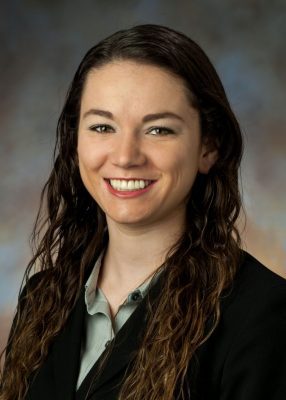 Kerry Lynn Davis-Amendola beautifully shares her experience as a current Ph.D. student in the Electrical Insulation Research Center (EIRC) paying special attention to the importance of her lab mates and the camaraderie that awaited her when she joined the lab. The inspiring article, The Best Part of a PhD that No One Is Talking About, appears in the “Young Professionals” section of the July/August 2023 edition of the journal IEEE.
Kerry Lynn Davis-Amendola beautifully shares her experience as a current Ph.D. student in the Electrical Insulation Research Center (EIRC) paying special attention to the importance of her lab mates and the camaraderie that awaited her when she joined the lab. The inspiring article, The Best Part of a PhD that No One Is Talking About, appears in the “Young Professionals” section of the July/August 2023 edition of the journal IEEE.
IMS Students
IMS Industrial Affiliates Program Hosts 2023 Annual Meeting
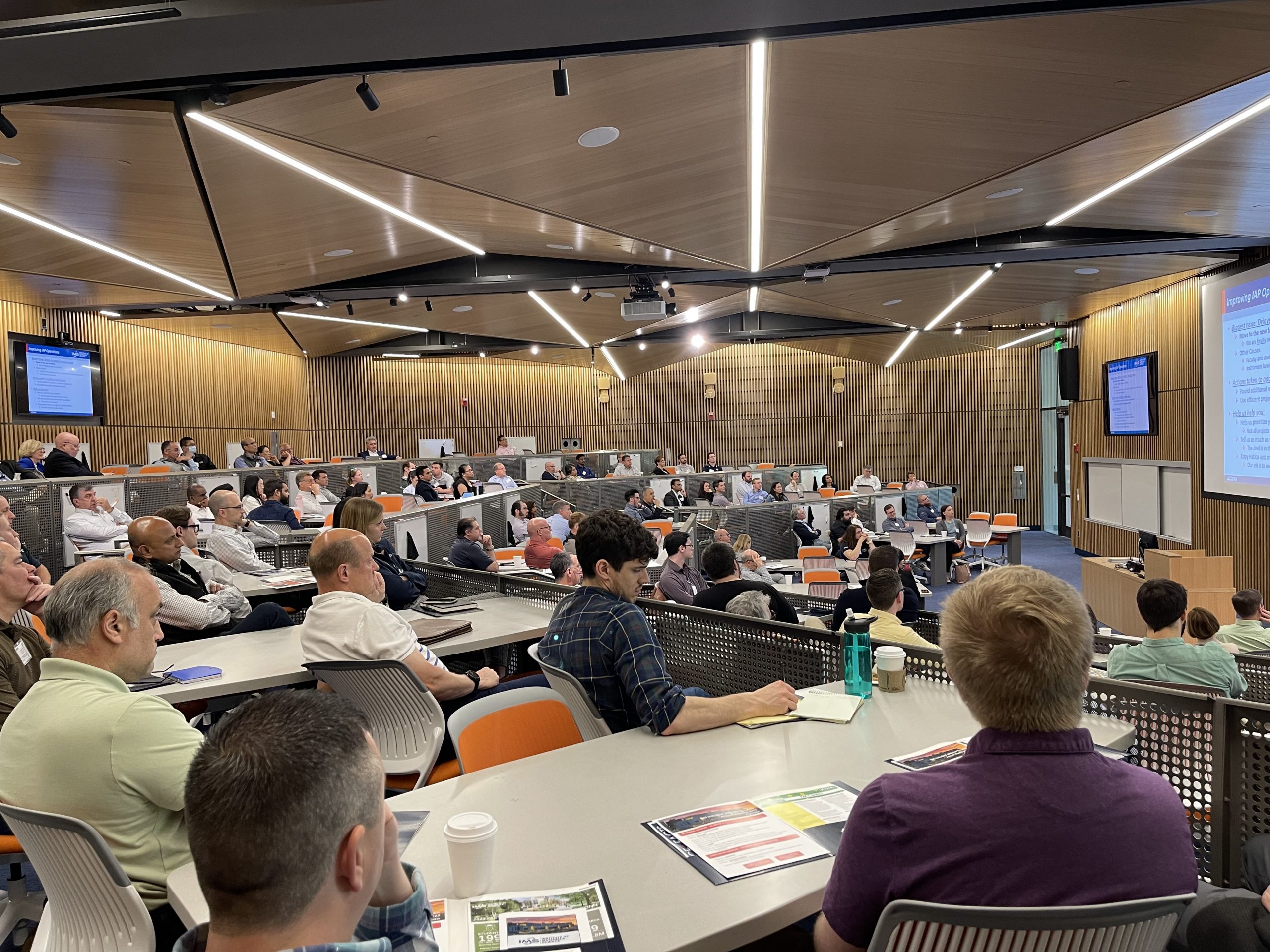
On May 25, 2023, the Institute of Materials Science (IMS) Industrial Affiliates Program (IAP) held its first in-person annual meeting since the onset of the COVID-19 pandemic in 2020.
The meeting began with a welcome message by Dr. Hatice Bodugoz-Senturk, Associate Director of the IMS Industrial Affiliates Program, followed by remarks by Dr. Steven L. Suib, Director of IMS, and Dr. Paul Nahass, Director of the IMS Industrial Affiliates Program. Dr. Bryan Huey, Department Head of Materials Science and Engineering (MSE) gave an overview of the MSE department and its achievements; and Dr. Kelly Burke, Director of the IMS Polymer Program, discussed the latest developments in polymer science.
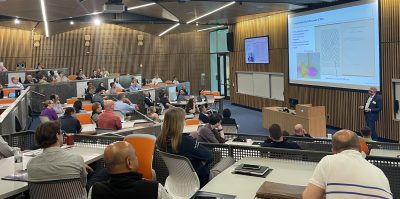
The morning session featured three presentations by IMS faculty members from different departments. Dr. James “Nate” Hohman, Assistant Professor of Chemistry, talked about his research on experimental foundations for next-generation materials and interfaces, and how he uses big science, big data, and big AI to discover new materials for various applications. Dr. Georgios Matheou, Assistant Professor of Mechanical Engineering, presented his work on predictive modeling and simulation of multi-physics flows, and how he collaborates with industry partners in renewable energy, aerospace, and health care sectors. Dr. Vahid Morovati, Assistant Professor of Civil and Environmental Engineering, explained his theoretical framework to model the long-term mechanical behavior of elastomeric materials considering damage accumulation and degradation.
The luncheon session featured a keynote address by Dr. Anne D’Alleva, Provost and Executive Vice President for Academic Affairs, who shared her vision and goals for UConn’s academic excellence and innovation. She also highlighted the importance and impact of materials science and engineering in addressing the global challenges and opportunities in the 21st century. The luncheon concluded with closing remarks by Dr. Paul Nahass.
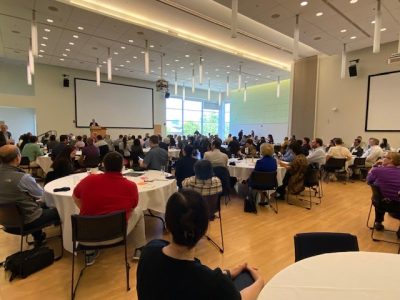
The meeting was attended by more than 100 participants from industry affiliates and external partners along with IMS faculty, students, and alumni. The meeting also showcased the annual Joint Poster Session by IMS Polymer Program and Materials Science and Engineering (MSE) students, demonstrating their projects and achievements in materials science and engineering. Industry partners were also given tours of core laboratories in the Science 1 building, the new home to IMS.
The IMS Industrial Affiliates Program provides materials characterization services to its industry partners. The program also facilitates collaborations between IMS faculty and students and industry partners on research projects of mutual interest.
The Institute of Materials Science is an interdisciplinary research institution that supports over 100 faculty members from 15 departments across UConn’s schools and colleges. The institute offers advanced degrees in polymer science and materials science, as well as state-of-the-art research facilities for its students and faculty to conduct research that is changing the future of materials science.
Polymer Program Announces 2021-2022 Awards
The IMS Polymer Program Awards committee has selected two awardees for the 2021 – 2022 academic year.
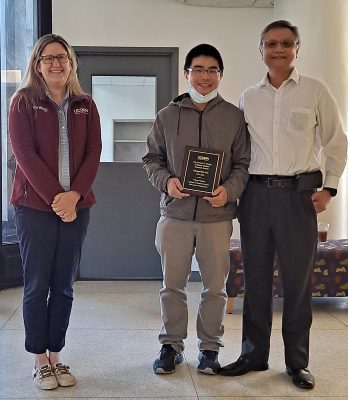
Chung-Hao Liu received the Samuel J. Huang Graduate Student Research Award. This award recognizes a graduate student for outstanding research in the field of polymer science and engineering. Chung-Hao completed is fourth year as a polymer PhD candidate under the guidance of Prof. Mu-Ping Nieh. He has been diligent in conducting advanced nanoscience research including materials characterization and designing polymer nanostructures. His efforts have resulted in two published journal articles, one currently in review, and contributions to many more. Chung-Hao has also made many collaborating efforts with other research groups and mentored undergraduate engineering students. Outside the lab, Chung-Hao has been an Society of Polymer Engineers, Storrs Chapter, committee member for 3 years, serving as both Vice President and President. His positive attitude and strong work ethics have made contributions to Prof. Nieh’s lab and the IMS research community.
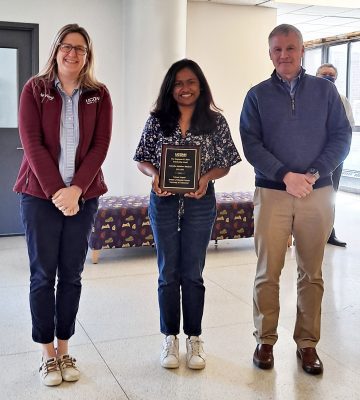
Probodha Abeykoon has been recognized as this year’s Stephanie H. Shaw Fellowship Scholar. This award is designated for a female student showing academic achievement and contributions outside of research. Probodha has served as the leader of the Adamson Research Lab and has taken it upon herself to be the resident expert in several analytical techniques, such as four-point probe and thermal conductivity. She has two published papers and a third manuscript recently submitted. She has also presented her work at several ACS National Meetings. During the past 4 years Probodha has grown in into an excellent scientist and group leader.
The polymer program congratulates this year’s awardees with their tremendous efforts in both research and leadership in the IMS community.
Rapid Virus Test Being Studied in Zhang Group will Differentiate SARS-CoV-2 from Other Respiratory Viruses
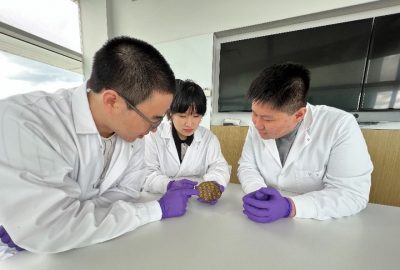
In recent years, from H1N1 and now to SARS-CoV-2, global pandemics caused by highly contagious viral species have been threatening human life and putting tremendous pressure on healthcare services as well as the economy. Rapid testing and timely interventions for asymptomatic or mild infections caused by SARS-CoV-2, for example, would enable efficient quarantine of infected patients, thus significantly reducing the spread rate of the virus. Importantly, SARS-CoV-2 is expected to continue in the future fall/winter seasons, when it will coincide with the seasonal outbreak of other infectious respiratory diseases, including those caused by influenza virus and respiratory syncytial virus, which have similar signs and symptoms in the early stages. Considering the overlap in the seasonal peaks, symptoms, and underlying risk factors of these illnesses, having a rapid test to detect and differentiate SARS-CoV-2 from other infectious respiratory viruses will be clinically important.
In response to this clinical need, the Institute of Materials Science and Biomedical Engineering Assistant Professor Yi Zhang led the development of the most sensitive amplification-free SARS-CoV-2 diagnostic platform, the CRISPR Cas13a graphene field-effect transistor. This study, entitled “Amplification-Free Detection of SARS-CoV-2 and Respiratory Syncytial Virus Using CRISPR Cas13a and Graphene Field-Effect Transistors,” was published online on May 12, 2022, in the journal Angewandte Chemie International Edition.
“The key features of viral diagnostics are rapidness and sensitivity,” said Zhang. According to Zhang, most virus detection techniques, including the gold-standard RT-PCR, relies on viral sequence amplification, which can dramatically complicate the detection process and increase the risk of cross-contamination, therefore subject to elevated false-positive rates. However, current amplification-free methods are still limited by compromised sensitivity. “Our work revolutionized the field of amplification-free nucleic acid diagnostics by introducing a biosensing platform with sensitivity comparable with RT-PCR,” he said.
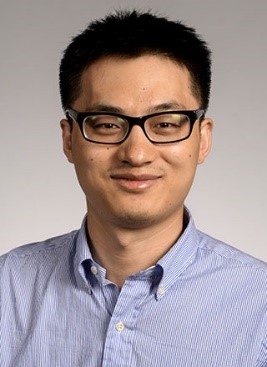
Derived from adaptive immunity in prokaryotes, Nobel-winning clustered regularly interspaced short palindromic repeats (CRISPR)/CRISPR-associated (Cas) technology leverages nucleic acid base pair complementarity between a guide RNA and targeted nucleic acid sequence and affords high target specificity capable of discriminating single mismatches. Recently, several CRISPR/Cas systems, including Cas13a, were found to perform cleavage of nonspecific bystander nucleic acid probes triggered by target detection, known as “collateral cleavage.” Such collateral cleavage demonstrates a multi-turnover behavior, turning a single target recognition event into multiple probe cleavage events, and therefore leads to signal amplification.
“The idea of our biosensor design originates from exploiting the signal amplification by translating CRISPR technology onto an ultrasensitive detection platform,” said Huijie Li, a Ph.D. student in Zhang’s lab; she is also the leading first author of the study. Graphene, as a two-dimensional material, exhibits extraordinary charge carrier mobility and thus high electrical conductivity. Thanks to its atomic thickness, graphene, when constructed into biosensors as a sensing material, is highly sensitive to the interaction with biological analytes. In this study, by immobilizing probes on graphene-based field-effect transistors and allowing Cas13a collateral cleavage of these probes activated by target detection, SARS-CoV-2 down to 1 aM level in both spiked and clinical samples, was successfully detected within a 30 min detection time.
Simply by changing the guide RNA design, CRISPR Cas13a graphene field-effect transistor platform was reconfigured to target respiratory syncytial virus with the same attomolar sensitivity. “As the COVID-19 pandemic wanes, our virus diagnostic tool can be easily adapted to combat the future outbreak of unknown viral species,” Guangfu Wu, a Postdoc in Zhang’s lab; he is the co-first author of this work, said.
This study marks a significant milestone towards our goal of developing an integrated point-of-care biosensing platform for viral diagnostics. “We are aiming to offer patients a fast, ultrasensitive all-in-one tool that can streamline sample treatment and analysis and deliver results without any specialized training,” said Zhengyan Weng, a Ph.D. student in Zhang’s lab; he is also the co-first author of this study.
This research is supported by the University of Connecticut start-up and the National Science Foundation under the award number CBET-2103025. The collaborators of this work include Dr. Xue Gao at Rice University (co-corresponding author), Drs. Kevin D. Dieckhaus and Lori Avery at UConn Health, and Dr. Yupeng Chen in the Department of Biomedical Engineering at UConn.